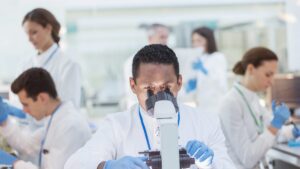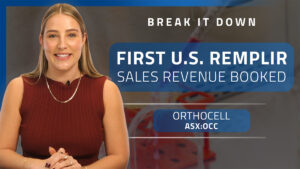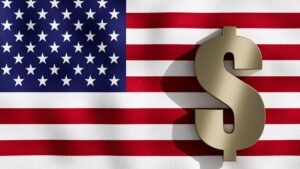Dr Boreham’s Crucible: Three out of four quarters says trust your about gut about Genetic Signatures

Tim Boreham is one of Australia's best-known small-cap share analysts and business journalists.
As Maxwell Smart said: “Missed it by that much.”
In Genetic Signatures’ (ASX:GSS) case, the close-but-no-cigar moment was its narrow June quarter loss of $169,000, which meant the company did not achieve four consecutive quarters of cash flow positive results.
If it had done so, it would no longer have been required to lodge quarterly reports to the ASX.
“I was quite disappointed,” says chief finance officer Peter Manley. “One [customer] payment arrived on the second of July, which might have got us there.”
Manley notes that most of the cash outflows pertained to the molecular diagnostic outfit’s investments in new customer sites, so it was ‘good’ spending.
Genetic Signatures also reported record revenue for the year to June 2022, but the reality is the company is exiting pandemic-era demand for its proprietary molecular testing products that enable faster and more accurate assays.
“We were early [with Covid testing] and we did well. Other companies thought it was like SARS [severe acute respiratory syndrome] and would go away,” says chief executive Dr John Melki.
Now, the molecular polymerase chain reaction testing has been replaced by the less reliable rapid antigen tests. And governments are eschewing mask mandates and compulsory isolation periods as quickly as you can say ‘re-election’.
The genesis of Genetic Signatures
Genetic Signatures was founded in 2001 by prominent fund manager Christopher Abbott and the late Dr Geoffrey Grigg, former head of microbiology at the esteemed Commonwealth Scientific and Industrial Research Organisation (CSIRO).
The company’s original focus was on commercialising technology using a sodium bisulphite conversion method which, it was discovered, could be used to develop molecular assays for infectious pathogens.
Genetic Signatures sprung from CSIRO’s laboratories in Sydney’s North Ryde.
Dr Melki joined the company in 2003, having researched DNA and microarray technologies.
Genetic Signatures listed on the ASX in March 2015, raising $7.5 million at 40 cents apiece.
The co-founder of boutique investment house Maple Brown Abbott, Christopher Abbott retains a 26 per cent Genetic Signatures stake.
A company with all its (3) bases covered
While there are plenty of molecular diagnostic providers, Dr Melki says Genetic Signatures distinguishes itself with its ability to do syndromic (that is, multiple) tests.
Genetic Signatures’ tests are based on its 3base platform, which can detect up to 20 organisms at a time from the one patient, thus shortening the wait time from days to hours.
Technically speaking, 3base converts the 4base microbial genome to three, with no additional steps required by the operator.
“3base allows us to detect the most common infectious agents with low-cost test kits,” Dr Melki says.
In Europe, there’s still a lot of gastro testing with agar plates, which means a four to five days turnaround – during which the patient has probably recovered anyway.
The kits can detect more than 150 diseases across five broad categories: enteric (intestinal), respiratory, antimicrobial resistance, fungal and sexually transmitted infections (which spiked post lockdowns as folk got – er – out and about).
One example in the enteric category is the gastro disease norovirus, the bane of cruise ships in pre-Covid times and no doubt the blight of seafarers as the floating germ palaces set sail again.
The tests also detect salmonella and giardia. In the respiratory space, the assays pick up influenza A and B as well as Sars-Cov-2 of course.
Commercialisation to date
Sold under the Easyscreen banner, Genetic Signatures’ tests were developed (and are made) in Australia, with sales in more than 30 countries but mainly on the company’s home turf.
More than two million patients have undergone at least one Easyscreen test.
The tests replace the old ‘sample on a slide’ laboratory methods, enabling rapid screening of pathogens so that the right antibiotics can be swiftly administered.
The company has approved tests for the enteric, respiratory and antimicrobial indications in Australia and Europe, while the latter has also approved sexually transmitted infections (STI) tests.
In April 2020, the company swiftly won consent to sell its Covid tests in Europe and Australia – and wasted no time shipping them.
An important feature of the Covid test is that it can distinguish between The Dreaded Plague – trade mark pending – and rhinovirus (a.k.a the common cold).
Dr Melki says Genetic Signatures is soundly positioned as authorities turn to the all-in-one testing approach.
For instance, the New South Wales Health Department is moving away from Covid tests to panel testing for Covid and influenzas A and B “at a minimum”.
“We are in a position where we can convert the Covid 19 customers we have gained to full panel testing.”
Finances and performance
Genetic Signatures revenue for the 2021-’22 year came in at $35.42 million, 25 per cent higher. But reflecting the tougher post-Covid conditions, June quarter sales declined 22 per cent to $4.9 million (year-on-year).
Despite the aforementioned June quarter loss, the company managed a $3.06 million profit for the year, up 74 per cent.
Manley notes that unlike for the year as a whole, in the June quarter non-Covid revenue was greater than Covid testing income. Barring a big new Covid screening program, that should continue to be the case.
The annual revenue derived 89 per cent from the Asia Pacific – mainly Australia – and 11 per cent from Europe.
Over the last 12 months Genetic Signatures shares have traded between $1.79 in late December 2021 and the late September 2022 low point of 82 cents.
Since listing Genetic Signatures shares have changed hands between 25 cents (March 2018) and $2.82 (July 27, 2020).
Genetic Signatures (ASX:GSS) stock share price today
Looking for home ‘runs’ in the US
A key focus for Genetic Signatures is its US Food and Drug Administration (510k) submission for its enteric protozoan kits, which it hopes to lodge by the end of 2022.
After Covid disruptions, the company managed to collect the requisite 1,500 samples to carry out the supportive trial (across three sites).
Found in the gut of humans and other mammals, enteric protozoa are diarrhoea-inducing parasitic infections including giardia and cryptosporidium. They are hard to detect with traditional methods and can cause chronic illness.
“Other tests will identify three to four of them, but Genetic Signatures’ tests can identify eight of these nasties at once, at least twice as many as rival kits,” Dr Melki says.
The company notes that about 5.5 million enteric protozoan tests are done in the US annually and the company aims for a 40 per cent market share.
Thanks for the reimbursement
Handily, there’s already a requisite US reimbursement (insurance) code, allowing for US$262.99 per test. This compares with a payment “in the low tens” for microscopy tests.
For the labs, this means testing can change from being a cost to a profitable activity. Genetic Signatures won’t pocket all of the US$263, but can expect a handy margin.
In the meantime, Australian molecular diagnostics reimbursement is a bit on the stingy side (our words): the going rate for a test targeting three or more diseases is a mere $32.
And seeing that you asked, in Wales, every suspected gastro case is subject to an Easyscreen test, generating $1.8 million of annual revenue for the company. Now that’s something to sing about!
Ticking the wrong box
Genetic Signatures this week was forced to admit to the ASX that an announcement on September 29 was inadvertently ticked as ‘market sensitive’.
The disclosure related to a publication in the peer review organ Journal Diagnostics, which referred to Easyscreen producing “excellent” results in testing for antimicrobial resistance.
Given the piece was published on September 14, the bourse wanted to know why the company took so long to ‘announce’ (our words) the epic news (still our words).
The company found out about the piece on September 23.
While regretting the error, the company noted that while the announcement wasn’t market sensitive it was still “relevant to shareholders given an independent entity had assessed one of the company’s products to be of sound quality”.
On behalf of the ASX, we consider the matter now closed.
Coming up …
While the tests themselves can work on any platform, the company also provides Easyscreen-specific instrumentation to laboratories with higher throughput.
Looking like a cross between a photocopier and a microwave, the units are available in three models of varying size and functionality.
The company is also working on a fully automated, next generation instrument for 3base assays. The device will combine extraction, analysis and recording in a single process “while maintaining throughput for multiple targets”.
It’s expected the machines will be available to laboratories on a reagent rental model (that is, free to the clients as long as they buy the consumables).
The company is also working on other indications including dermatophytes (fungus), tick-borne nasties (such as Lyme disease), mosquito-borne tropical diseases and Japanese encephalitis (pronounced, by the way, with a hard ‘c’).
The company is also working with the FDA on a potential trial for a second test. Dr Melki says the trial will be easier to run than the enteric protozoan effort, because samples will be more readily available.
Dr Boreham’s diagnosis:
In the words of Frank Sinatra, can the company just pick itself up and get back in the race, share price wise?
Much depends on the degree to which the company can replace Covid-related revenues from those deriving from the rest of the 150-plus pathogens which its Easyscreen tests can detect.
“The year ahead is going to be about investing in growth for the transition from Covid related business to the broader business,” Manley says.
The still-raging Covid aside, Genetic Signatures remains just as relevant in a diseased world – and we’re talking literally as well as metaphorically.
Not surprisingly, management’s focus is on building Europe and US revenues, given these geographies account for 70 per cent of the global molecular testing market.
“Australia is one to two per cent of the world market, so if we can replicate what we do in Australia over there, we are in clover,” Dr Melki says.
Disclosure: Dr Boreham is not a qualified medical practitioner and does not possess a doctorate of any sort. But rest assured, he treats his columns as more than a box-ticking exercise.
This column first appeared in Biotech Daily

UNLOCK INSIGHTS
Discover the untold stories of emerging ASX stocks.
Daily news and expert analysis, it's free to subscribe.
By proceeding, you confirm you understand that we handle personal information in accordance with our Privacy Policy.








